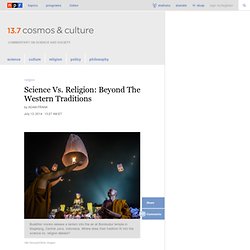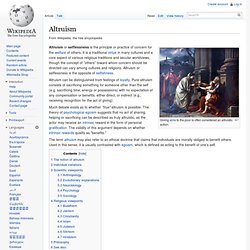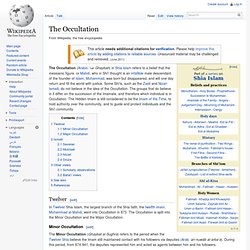

Islam's reach. Study Theology, Even If You Don't Believe in God. This lost liberal art encourages scholars to understand history from the inside out.

When I first told my mother—a liberal, secular New Yorker—that I wanted to cross an ocean to study for a bachelor’s degree in theology, she was equal parts aghast and concerned. Was I going to become a nun, she asked in horror, or else one of “those” wingnuts who picketed outside abortion clinics? There’s No God in Antarctica.
All photos by Jo Stewart Lots of folks fantasize about “getting away from it all,” but few actually put their money where their mouths are.

Backpacking in Europe or Southeast Asia or fucking off to some tropical island for some guidebook-approved relaxation might be a nice change of pace, but the bottom line is you’re still surrounded by people and all the problems that come with them. If you curse society long enough, however, the universe will provide you with an escape route, should you want to take it—or at least it did in my case, when I was offered the opportunity to work on a yacht that was filming a documentary in Antarctica.
Science Vs. Religion: Beyond The Western Traditions : 13.7: Cosmos And Culture. Buddhist monks release a lantern into the air at Borobudur temple in Magelang, Central Java, Indonesia.

Where does their tradition fit into the science vs. religion debate? Ulet Ifansasti/Getty Images hide caption itoggle caption Ulet Ifansasti/Getty Images Buddhist monks release a lantern into the air at Borobudur temple in Magelang, Central Java, Indonesia. Where does their tradition fit into the science vs. religion debate? Ulet Ifansasti/Getty Images In the United States, the debate between science and religion seems to be powered by a perpetual motion machine. Altruism. Giving alms to the poor is often considered an altruistic action.

Altruism or selflessness is the principle or practice of concern for the welfare of others. It is a traditional virtue in many cultures and a core aspect of various religious traditions and secular worldviews, though the concept of "others" toward whom concern should be directed can vary among cultures and religions. Altruism or selflessness is the opposite of selfishness. Altruism can be distinguished from feelings of loyalty. Pure altruism consists of sacrificing something for someone other than the self (e.g. sacrificing time, energy or possessions) with no expectation of any compensation or benefits, either direct, or indirect (e.g., receiving recognition for the act of giving).
Much debate exists as to whether "true" altruism is possible. In the Shadow of His Wings » Nature & Weather. Top Ten List. The Bahá’í Faith - The international website of the Bahá’ís of the world. `Abdu'l-Bahá. Martha Root. Martha Louise Root Martha Louise Root (August 10, 1872 – September 28, 1939) was a prominent traveling teacher of the Bahá'í Faith in the late 19th and early 20th century.

Shoghi Effendi, then head of the Bahá'í Faith, called her "the foremost travel teacher in the first Bahá'í Century", and named her a Hand of the Cause posthumously. Known by her numerous visits with Heads of State and other public figures, of special importance was her efforts with Queen Marie of Romania, considered the first Monarch to accept Bahá'u'lláh. Early life[edit] Martha Root was born on August 10, 1872 to Timothy and Nancy Root in Richwood, Ohio. Writing career[edit] While she started teaching after her degree, she gave that up to start writing for different newspapers. Bahá'í Faith. The Bahá'í Faith (Arabic: بهائية Baha'iyyah) /bəˈhaɪ/[1] is a monotheistic religion emphasizing the spiritual unity of all humankind.[2] Three core principles establish a basis for Bahá'í teachings and doctrine: the unity of God, that there is only one God who is the source of all creation; the unity of religion, that all major religions have the same spiritual source and come from the same God; and the unity of humanity, that all humans have been created equal, and that diversity of race and culture are seen as worthy of appreciation and acceptance.[3] According to the Bahá'í Faith's teachings, the human purpose is to learn to know and love God through such methods as prayer, reflection and being of service to humanity.

The Bahá'í Faith was founded by Bahá'u'lláh in 19th-century Persia. Bahá'u'lláh was exiled for his teachings, from Persia to the Ottoman Empire, and died while officially still a prisoner. Etymology[edit] Progressive revelation (Bahá'í) The Occultation. Twelver[edit] In Twelver Shia Islam, the largest branch of the Shia faith, the twelfth imam, Muhammad al-Mahdi, went into Occultation in 873.

The Occultation is split into the Minor Occultation and the Major Occultation. Minor Occultation[edit] The Minor Occultation (Ghaybat al-Sughra) refers to the period when the Twelver Shia believe the Imam still maintained contact with his followers via deputies (Arab. an-nuwāb al-arbaʻa). During this period, from 874-941, the deputies represented him and acted as agents between him and his followers.